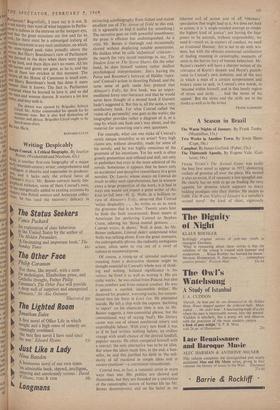Writing Despicably ' It ehlgent, it absorbs and supersedes its predeces- ors,
and it lacks only the critical force of Joyce. Mr. Baines corrects hardy bio- j1r4,Phieal mistakes, some of them Conrad's own; hnna.s energetically added to existing accounts by i quirt' into Polish sources and American collec- tions; 43ns; he has used the necessary delicacy in extracting autobiography from fiction and makes excellent use of The Arrow of Gold to this end. (It is agreeable to find it useful for something.) The narrative goes on with powerful smoothness; the prose is efficient but undistinguished. As a critic Mr. Baines is thorough and occasionally shrewd without displaying notable penetration. He dislikes what he calls 'alchemical' criticism— the search for very occult meanings in, say, The Shadow Line or The Secret Sharer. On the other hand, he does himself venture rather shallow psychological interpretations : Jim's leaving the Patna and Rasumov's betrayal of Haldin 'repre- sent' Conrad's action in deserting Poland, and the same sense of guilt made him pretend that Almayer's Folly, his first book, was an unpre- meditated foray into literature and that he would never have thought of a second book if Garnett hadn't suggested it. But this is, all the same, a very satisfactory book. For what Conrad called 'the vision of a personality' one goes to,the works; the biographer provides rather a diagram of it, or a map by which one finds one's way about, and the material for answering one's own questions.
For example, what can one make of Conrad's surely unique instability as an artist? Very high claims are, without absurdity, made for some of his novels; and he was highly conscious of the greatness of his intentions. Yet his work is often grossly pretentious and inflated and dull, not only in potboilers but even in the most admired of the novels. Sometimes it appears that he bears only an accidental and deceptive resemblance to a great novelist. Dr. Leavis, whose essays on Conrad do much to allay such apprehensions, has to winnow away a large proportion of the work; it is bad in ways one would not expect a great writer of this kind to fall into—H. G. Wells, in a brilliant re- view of Almayer's Folly, observed that Conrad `writes despicably . . he writes so as to mask the greatness that is in him.' Twenty years later he finds the fault uncorrected; Boon sneers at Americans for preferring Conrad to Stephen Crane, adoring his 'florid mental gestures. . . . Conrad writes. It shows.' Well, it does. As Mr. Baines indicates, Conrad didn't understand what Wells was talking about. Even the great moments. the unforgettable phrase, the radiantly ambiguous action, often seem to rise out of a swirl of tedious or mannered prose.
Of course, a rising-up of splendid individual meaning from a destructive element might be thought essential to Conrad's whole way of think- ing and writing. Isolated significance is his metier; he lived it as well as writing it. His are exilic works : he was exiled from Poland. but also from comfort and from natural conduct. He was a poseur, a morbid, inaccessible drifter. He deceived his prudent, worrying uncle, but remem- bered him for Stein in Lord Jim. He attempted suicide. He left a ship with the captain 'declining to report' on his character (this is not, as Mr. Baines suggests, a non-committal phrase, but the conventional way of saying `bad'). His literary career was one of almost unrelieved misery and unprofitable labour. With every new book it was as if he had written nothing before, an endless voyage with small chance of the desired landfall, popular success. He often compared himself with a convict; the only alternative was to be an idiot. But when the idiots made him, in the end, a best- seller, he said this justified his faith in 'the soli- darity of all mankind in simple ideas and in sincere emotions'—a convenient romanticism.
Conrad was, in fact, a romantic artist in more ways than one. His politics are shrewd and illusionless, but they are founded on a conviction of the catastrophic nature of human life (as Mr. Baines demonstrates) and on his belief in the
inherent evil of action and of all 'visionary' speculation that might lead to it. Art does not lead to action; it is 'a single-minded attempt to render the highest kind of justice'; not having the hap- piness to be animals, without responsibility, we need it—much as, in matters of conduct, we need an irrational Honour. Art is not to do with wis- dom, but with the obscure emotional satisfaction of finding meaning in catastrophe, moments of sense in the barren fury of human behaviour. Mr. Baines's readers will have a sharper notion of the relevakice of Kurtz's despair and Heyst's punish- ment to Conrad's own isolation, and of the way in which a man of a certain temperament and history came to seek, in Conrad's own words, to `descend within himself, and in that lonely region of stress and strife . . . find the terms of his appeal.' But the stress and the strife are in the books as well as in the writer.
FRANK KERMODE










































 Previous page
Previous page